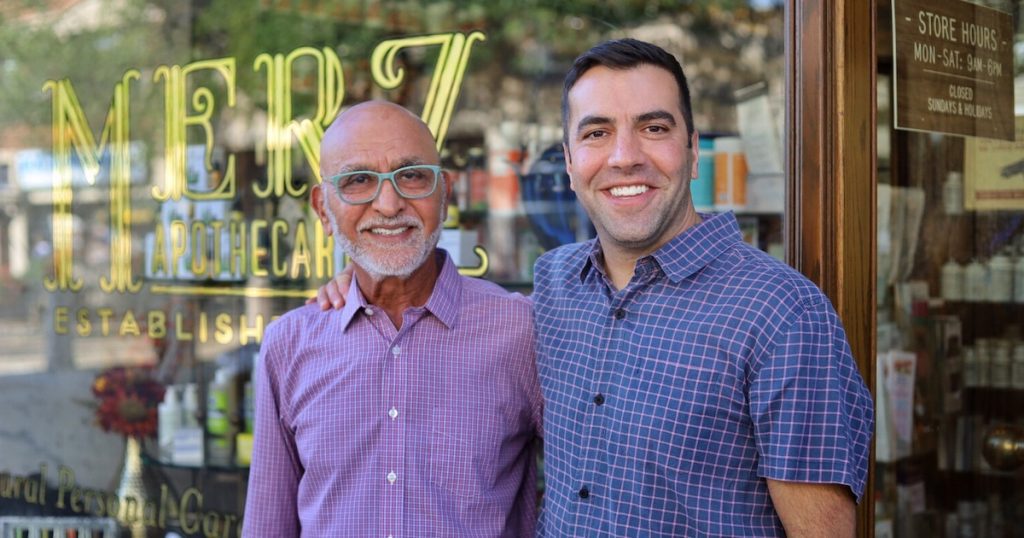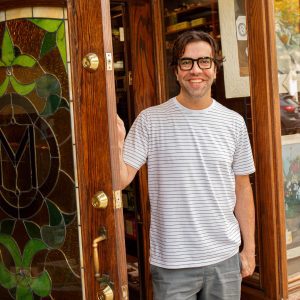Pharmacy Spotlight: Anthony Qaiyum of Merz Apothecary

What are consumers looking for from homeopathy today? As manufacturers, how can we best serve them? An excellent way to get a pulse on our consumers is to look to those who engage closely with them daily — homeopathic pharmacies and other natural retailers.
AAHP interviewed Anthony Qaiyum, President of Merz Apothecary, a Chicago-based brick-and-mortar store with a robust e-commerce platform, in the third installment of our Pharmacy Spotlight Series. During our conversation, Qaiyum covered a myriad of topics ranging from the business’ history, homeopathy's future, Merz’s passion for serving customers, consumer behaviors, and more.
AAHP: Tell us about Merz Apothecary and yourself.
AQ: Merz Apothecary was founded in Chicago in 1875 and was run by the Merz family for three generations. My father and business partner, Abdul Qaiyum, bought the apothecary in 1973, just before it was going to close permanently. He was a young pharmacist who was disenchanted with filling prescriptions, and he fell fast in love with this unique, European-style apothecary. In his first year, the business grew a great deal, so he continued building the business and innovating in the following decades.
I was born that same year and grew up in and around the store. I knew it was a special place, but I never saw myself working in the business when I got older. But after being part of a web startup in the mid-90s, I realized I wanted to build the online version of Merz. I created the online extension of Merz, called Smallflower, when small businesses did not generally have e-commerce capabilities. As early adopters, we enjoyed many opportunities for the business over the years. And here I am, almost 25 years later, running one of the country's most fun and interesting retail businesses.
AAHP: What are your customers looking for from homeopathy today? What types of products are consumers interested in?

AQ: We are unique in that we have a lot of customers looking for single remedies, often in hard-to-find potencies. Because of our history as a homeopathic pharmacy that works with some of the best-known practitioners in Chicago and across the country, we have a much broader selection of single active ingredient products than you would find even in most health food stores or homeopathic pharmacies. We serve customers across the country daily with special orders from our ready-to-ship assortment. Of course, we still have many customers who are looking for combinations as well. Your average customer is usually looking for homeopathy to help with everyday issues that our current medical system doesn't seem to serve well, such as common allergies, restless sleep, and low-level aches and pains. These are examples of things our customers always come in for.
AAHP: As a retailer/pharmacy, what would you like to see offered (e.g., product types, package/size alternatives, different dosage forms)?
AQ: As a retailer, I think having packaging that clearly explains the usage of the product and the symptoms it addresses is always really helpful. That seems obvious, but it is surprising how many products on the market don't do that well enough. I also think we live in a world increasingly built around portability, travel, and convenience, so many homeopathic products address issues happening throughout the day. A convenient and safe way to carry those medicines around is common sense. I don't think foil-backed plastic packaging is really the consumer-friendly solution that makes people excited about homeopathy.
AAHP: What do you think consumers would like to see offered?
AQ: The portability needs I mentioned above come from what I see and hear in the store. Also, I think there is a growing movement around limiting waste in packaging. I'm not sure how that can be furthered in homeopathic products, but whoever can figure it out will have a big advantage.
AAHP: Have you noticed any trends in consumer behavior in-person vs. online?
AQ: Online customers tend to focus more on replenishment because of the nature of the platform. There are some differences in popularity between online and in-store purchases. Still, the more interesting differences come from the fact that customers can interact with a pharmacist in our store and ask many questions — this is the biggest insight. Consumers are starved for one-on-one attention from someone with knowledge and domain authority. The reality of our medical system is that even the most interested doctor does not have much time to spend with a patient. Part of the appeal of homeopathy in our pharmacy is that we can give a lot of one-on-one attention. It is not easy to build into a large business model because expertise in homeopathy is hard to find, but the demand is there.
AAHP: Can you forecast any trends for the coming years?
AQ: Predictions are hard, but I think it's safe to say we will see more products building name recognition faster than ever due to the proliferation of testimonials and "social proof," which will mostly come in the form of user-generated videos. I think we will see more superstar homeopathic products in the next five years than ever before.
AAHP: How can manufacturers support retailers and pharmacy owners like yourself?
AQ: Given the growing demand across our sales channels, staff training is a huge lever for growth. Also, manufacturers should be looking at how they can drive awareness of the retailers in local markets. That was not very easy in the days of print, radio, and TV, but now it is easier to digitally reach small slices of the market. Letting consumers know where to find products locally is a great way to build a healthy brand/retailer ecosystem.
AAHP: What does the future of homeopathy in the U.S. look like?
AQ: The future is very bright from a customer demand point of view. People want safe and effective options, and the standard pharmaceutical industry does not adequately serve so many issues. I worry about the regulatory landscape and how that might affect the future of homeopathy. But my domain is helping consumers, and I'm an optimist.
AAHP: Is there anything else we should talk about?
AQ: I want to mention that I am a huge fan and user of homeopathy. It has been a central part of the health practice for myself and my family over the years. My favorite personal experience is with our younger daughter, who is now 15 years old. As an infant, she was never a great sleeper, having difficulty falling and staying asleep. By the time she was 18 months old, she'd never really had a solid night. It was unhealthy for her and took a toll on me and my wife. We were always exhausted, which was not good for our family and marriage. We had tried all kinds of natural products and behavioral therapeutic practices, but nothing had worked.
been a central part of the health practice for myself and my family over the years. My favorite personal experience is with our younger daughter, who is now 15 years old. As an infant, she was never a great sleeper, having difficulty falling and staying asleep. By the time she was 18 months old, she'd never really had a solid night. It was unhealthy for her and took a toll on me and my wife. We were always exhausted, which was not good for our family and marriage. We had tried all kinds of natural products and behavioral therapeutic practices, but nothing had worked.
We then went to see the homeopathic doctor I had seen throughout my childhood. He met with us and spent about 90 minutes asking questions, observing our daughter, recommending a single remedy, and asking us to use it for three nights. The first night took a while for her to sleep, but she stayed in bed until the following morning. The next night she didn't complain or try to get up when we put her to bed, and she had another full night of sleep. On the third night, she said good night and closed her eyes before we even left the room. After that, we can count on one hand the number of times she woke up in the night over the next five years. She is still an amazing sleeper today.
I bring this up not to say that this will happen for everyone, but to point out the positive experiences of homeopathic consumers who continue to be the engine of the industry. I'm excited that Merz Apothecary and Smallflower play a role in that process.
Want more insights from homeopathic retailers? Check out our interviews with Santa Monica Homeopathic and Medly Pharmacy.
